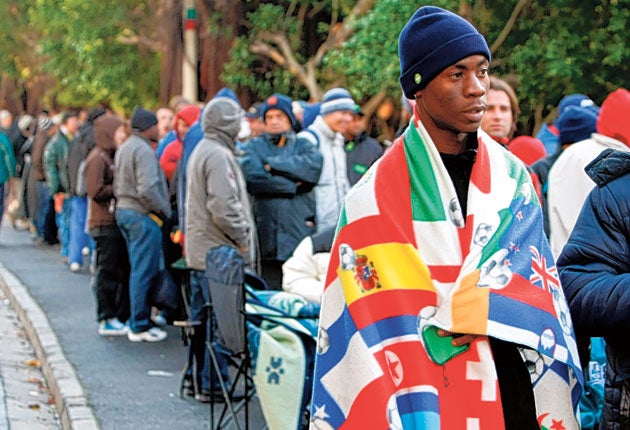Hosts counting the cost of low turnout on highveld
The financial boom anticipated in southern Africa as a result of the World Cup is failing to materialise. Glenn Moore reports

The hills are alive with the sound of "man on", but on the highveld, it's far too quiet. With less than a fortnight to go to the start of the World Cup the cream of the globe's footballers are mostly preparing for their African expedition... in the Alps.
Australia arrived in South Africa on Wednesday, followed by Brazil and Denmark, but the majority of teams have eschewed the host nation, preferring to prepare thousands of miles away in Europe. The Alps currently accommodate the highest concentration of elite footballers ever gathered together out of competition, nearly 20 teams including Fabio Capello's England.
That European teams are getting their altitude training done in Europe is perhaps to be expected. More surprising is that African nations such as Ivory Coast, Cameroon and Algeria have done the same, as have far-flung Japanese, Hondurans and Kiwis, all of whom have a preponderance of domestic, rather than European-based players in their squad.
Perhaps the oddest training camp is Ghana's. They are based in Paris, which is neither at altitude nor, in climate, similar to the cool temperatures expected in a South African winter. Fred Pappoe, Ghana FA vice-president, explained: "We wanted somewhere our players could assemble without much hustle and long travel. Secondly you have to look at the facilities. We wanted a place where we can get very decent facilities and a serene atmosphere."
Therein lies a clue or two. Even African countries do not want to prepare amid the joyous chaos often found in Africa. All of which is a disappointment, not just to South Africa but also nearby nations such as Botswana, Zambia, Namibia, Mozambique and Zimbabwe. When the finals were awarded to South Africa it was stressed that this would be an African World Cup, promoting and benefiting the whole region. Teams were expected to prepare in these countries. Brazil are playing warm-ups in Zimbabwe and Tanzania, but they are an isolated example.
This is only the latest blow to hopes that the World Cup will bring an economic boom to southern Africa. While the massive investment in stadiums and infrastructure produced a brief boost in employment (albeit with stadium construction workers being paid 88p an hour) long-term benefits are less sure.
A Reuters poll of economists this week suggested growth would be modest, the experts forecasting a median 0.3 per cent spike. "Although there will be a lasting positive effect on the South African economy via further infrastructure development, investment and tourism, it is likely to disappoint from initial expectations," Noelani King Conradie, at NKC Independent Economists in Cape Town, said. The last World Cup in Germany produced an economic lift before and during the tournament, but there was a slowdown afterwards. One problem Germany encountered was a drop in regular tourism; this is less of an issue in South Africa as the tournament is taking place in the southern hemisphere winter. However, visitor numbers will be far fewer than anticipated, less than half the 750,000 originally hoped for. This is partly due to the global economic downturn – Fifa's hospitality income is down more than 50 per cent on 2006, but also because of fear of crime, and the rapacious approach of South Africa's hoteliers, who ramped up prices.
The fact that hotels selling rooms through Fifa have to pay a 30 per cent cut to Match, a Swiss firm part-owned by a company whose president is Sepp Blatter's nephew, Philippe Blatter, has not helped. Fifa's internet-based ticketing policy and high prices have also been a factor. Only 40,000 tickets have been sold to fans in African nations other than the hosts.
It is not only the hoteliers who will not make as much capital as hoped. Street vendors who sell food and souvenirs have fallen foul of Fifa's fierce commercial department, which pursues anyone using the logo "World Cup" without paying a licence fee. Fifa said it wishes to "spread the economic benefit of the World Cup to ordinary South Africans" but in reality many of its deals have been struck with foreign companies. For example, Fifa sold exclusive merchandising rights to Global Brands Group. The Singapore-based conglomerate was then revealed to have sub-contracted the production of mascot toys to a Chinese sweatshop.
On match days there will be an 800-yard exclusion zone around grounds and fan zones within which only licensed companies, such as McDonald's, can operate. Amos Ndlovu, who has sold meats outside Johannesburg's Ellis Park stadium for 14 years, told AFP: "We are going to lose income. These Fifa people only care about themselves and their rights. This is a uniquely South African experience. We were looking forward to sharing it with foreign fans who have no idea how a sheep head is served."
Subscribe to Independent Premium to bookmark this article
Want to bookmark your favourite articles and stories to read or reference later? Start your Independent Premium subscription today.

Join our commenting forum
Join thought-provoking conversations, follow other Independent readers and see their replies